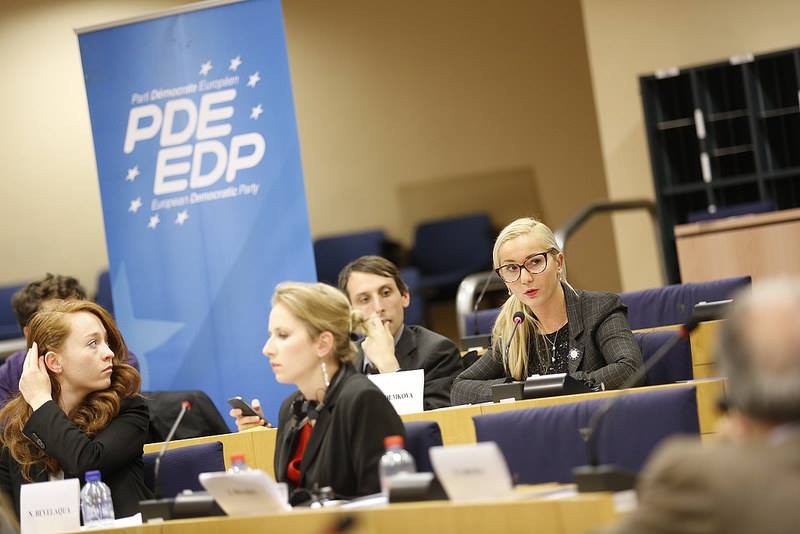Dr. Mihai SEBE
Le 16 novembre 2014, l’actualité politique roumaine a été marquée par la victoire au deuxième tour de l’élection présidentielle de Klaus IOHANNIS, candidat de l’Alliance chrétienne-libérale (Centre-droit), face au Premier ministre social-démocrate, Victor PONTA.
C’est le point culminant d’une campagne électorale assez morne dans l’ensemble qui a évolué entre les deux tours, suite à des erreurs politiques faites par le parti de gouvernement et qui ont mené à la victoire du candidat d’opposition, avec un pourcentage de 54,43%. Il est également important de souligner le taux de participation impressionnant de 64,10%.
Cela a été pour beaucoup de Roumains une réelle surprise si on tient compte de la différence de notoriété des deux candidats et de leurs partis ainsi que les ressources utilisées.
Mais qu’est-ce que cela change ?
On a pour la première fois un président minoritaire, un homme « Nouveaux » : du point de vue ethnique – il fait partie de la minorité allemande – que religieux – de confession protestante – sur le fond d’une campagne politique nationaliste menée par ses adversaires – c’est un message que le peuple roumain envoie à l’Occident.
Les principales causes de la victoire
Klaus IOHANNIS a gagné grâce à 3 éléments apparemment sans lien :
1) la Diaspora roumaine
Ce n’était pas le vote de la diaspora en lui-même qui a réussi à imposer Klaus IOHANNIS comme président mais la mauvaise gestion des élections à l’étranger par le gouvernement roumain. Le nombre insuffisant de bureaux de vote à l’étranger, doublé par la forte émotion produite par les incidents entre les citoyens roumains et les forces d’ordre à travers l’Europe, à cause de leur impossibilité de voter, a été décisif pour les citoyens indécis. Au pays on a eu l’impression qu’on avait à faire à une “action dirigée” qui visait à empêcher la diaspora de voter. Cette impression a suscité de vives émotions et a contribué à la victoire de l’opposition.
2) les conflits au sein de la société roumaine
Les contestations de l’hiver 2011 – 2012 et 2013, menées souvent pour des sujets assez éloignés des préoccupations quotidiennes de la société roumaine (les exploitations minières en utilisant des cyanures, la fracturation hydraulique) ont créé une minorité active d’un point de vue civique qui, peu à peu, a réussi à motiver une masse critique de citoyens à s’intéresser à la vie politique tout en testant les divers moyens de communication alternatifs aux media traditionnels.
Cette masse critique de citoyens a réussi à se mobiliser politiquement dans les moments décisifs – on a donc une vraie « force de choque » civique qui a utilisé avec succès des tactiques de guérillas politique contre des autorités et partis politiques trop importants pour réagir d’une manière aussi rapide, tout en bénéficiant de l’attitude favorable ou au moins neutre de la grande majorité de la population.

3) les campagnes de la société civile contre la corruption et l’abus de pouvoir
On a assisté ces derniers mois à un grand nombre d’arrestations dans la classe politique et sur le fond des hésitations ou même de l’hostilité des politiciens. La population semble avoir eu la perception que le gouvernement socialiste et le Parlement essayaient de protéger les corrompus. Par conséquent, une victoire du premier ministre socialiste aurait donné l’impression qu’il était mis un terme à la campagne anti-corruption de la justice et que celui-ci, en sa qualité de président, aurait essayé d’en limiter les actions.
Les leçons à tirer de la campagne présidentielle
1) le rôle des media traditionnels dans le débat politique
Les media traditionnels ont un rôle important mais il ne faut pas surestimer leur force. Une bonne campagne qui utilise des outils alternatifs de communication peut avoir du succès. Les media traditionnels “partisans” ont leur rôle mais pour une plus grande efficacité, impartialité et respect de la vérité, les nouveaux media garantissent une meilleure information.
2) le rôle de l’Internet et des réseaux sociaux
Les nouveaux media peuvent tout changer comme ce fut le cas lors de ces élections lorsque la diaspora roumaine, qui attendait de voter, a envoyé dans le pays via ces outils, un nombre important de messages de mécontentement vers leurs familles et amis qui, à leur tour, l’ont diffusé. On a donc assisté à une avalanche médiatique ou chaque récepteur est devenu à son tour un émetteur.
3) le problème de la diaspora
Jusqu’à présent, les émigrés jouaient davantage un rôle économique par l’argent qu’ils envoyaient à leurs familles. Mais sur le fond d’une législation électorale déficitaire (l’absence des prévisions sur le vote électronique et par correspondance) et sur le fond d’une mauvaise organisation de la part des officiels, la diaspora a joué un rôle clef dans le combat politique. Désormais, la force politique de la diaspora devra être pleinement considérée.
4) l’importance de la jeunesse
Beaucoup de stratèges politiques ignorent souvent la jeunesse car ils considèrent les jeunes comme un électorat instable, difficile à fidéliser pour une cause partisane. Lors de ces élections présidentielles les jeunes se sont exemplairement mobilisés par rapport aux autres élections et c’est leur vote qui a changé le résultat. Les jeunes ne sont pas réceptifs à la manière traditionnelle de mobilisation partisane mais ils sont assez sélectifs et réagissent mieux aux nouveaux media.
5) le rôle surestimé de l’Église (orthodoxe roumaine)
L’Église orthodoxe roumaine, que beaucoup jugent influente dans les milieux ruraux roumains, a gardé généralement, selon moi, une attitude neutre du point de vue politique et religieux en ne s’engageant pas, à quelques exceptions, dans une campagne négative menée sur les différences religieuses.
6) l’importance des valeurs politiques – la lutte contre la corruption et le « système »
Il est à noter que les valeurs comptent encore. Si on base la campagne politique sur des valeurs réelles, et si on choisit des candidats capables de respecter et de promouvoir ces valeurs universelles (telles la démocratie, l’égalité devant la loi etc.) les chances de succès sont multipliées.
« Dans leurs jugements, les premiers rois étaient parfaits, parce qu’ils avaient fait des principes moraux le point de départ de toutes leurs entreprises et la racine de toute chose bénéfique. Toutefois, ce principe échappe totalement aux personnes d’intelligence médiocre. Ne le saisissant pas, ils n’en prennent pas conscience et n’en étant pas conscients, ils recherchent le profit. Mais dans leur quête du profit, il leur est absolument impossible d’avoir la certitude de l’atteindre jamais. »
Lu Bu-wei 246 avant JC, Premier-ministre chinois sous l’empereur Ying Zheng, Les Annales de Lu Bu-wei, Lu Shi Chun Qiu
7) les spécificités politiques villes – milieux ruraux
Les électeurs des villes sont plus instables et plutôt tentés de voter pour la droite. C’est avec cet électorat qu’on peut faire la différence mais cela suppose un parti très structuré et c’est ainsi qu’on arrive à la dernière leçon donnée dans cette campagne.
8) l’importance de la fidélisation des fiefs électoraux et le rôle d’une campagne intensive de maison à maison – le rôle des activistes et analyses
Il faut développer un appareil politique capable à faire une campagne électorale de maison à maison, un grand réseau, avec des membres prêts à se mobiliser et qui se comportent de façon professionnelle.
Aussi, à partir des résultats des autres élections il faut “particulariser” chaque circonscription électorale et identifier d’une manière correcte les spécificités sociales et culturelles des citoyens de cette circonscription pour pouvoir faire une campagne plus personnalisée.
De plus, il est important d’avoir une direction très bien définie afin de savoir quelle voie il faut suivre et de respecter la vision de cette voie même si les paroles peuvent varier, aussi bien que les circonstances.
Le vote du 16 novembre est encore au début de ses effets. Il vient de libérer toute une série d’énergies sociales et politiques encore très difficiles à quantifier et il demande une analyse approfondie. On a vraiment à faire à un vote positif, pour Klaus Iohannis ou plus probablement à un vote négatif contre l’élite politique roumaine ? Est-ce que c’est le signal d’un changement politique plus profond ? On est en train de voir car l’histoire ne dort jamais.





